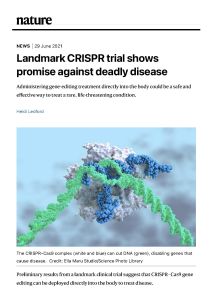
Article
Landmark CRISPR Trial Shows Promise Against Deadly Disease
Administering gene-editing treatment directly into the body could be a safe and effective way to treat a rare, life-threatening condition.
Nature,
2021
References:
Gillmore et al. (2021)
1×
Log in to listen to the audio summary.
Recommendation
Previous gene-editing therapies involved removing cells from the body, revising their genetic material, then re-infusing the cells. A breakthrough clinical trial now proves that gene-editing components called CRISPR-Cas9 can be injected directly into the body with astonishing results, offering hope to those suffering from at least one painful, life-threatening disease. Scientists think similar therapies could improve the lives of countless others.
Summary
About the Author
Heidi Ledford is a senior reporter for Nature. She specializes in biomedical topics such as cancer research, drug development, biotechnology and CRISPR.








Comment on this summary